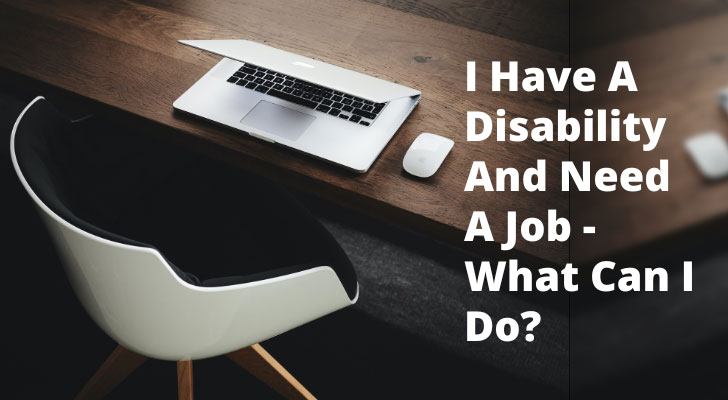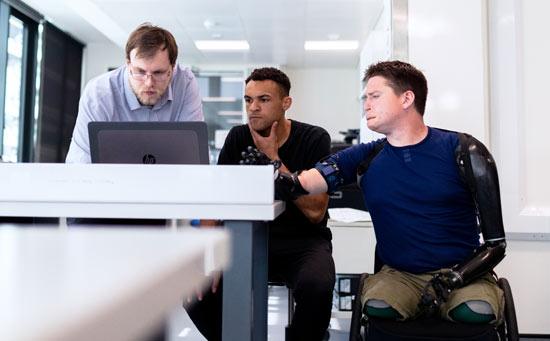You want to find a good job and support yourself. We all do. And the lack of work opportunities that match your abilities and interests is really frustrating for those with disabilities. And when I say disabilities, not just physical but also mental, you know? People who keep themselves fit - run miles every day, weights and all, but they lack communication skills. You know how hard to find a job, but once you find one, getting on with others is the next big hurdle.
So what are the options?

Did You Know?
- Global Employment Rate: The employment rate for people with disabilities is about half that of people without disabilities.
- U.S. Employment Rate: In the U.S., around 19% of persons with a disability were employed in 2021.
- Unemployment Rate: The unemployment rate for persons with disabilities is typically double that of those without disabilities.
- Underemployment: Many employed disabled individuals are underemployed compared to their qualifications.
- Wage Gap: On average, workers with disabilities earn about 66% of what their non-disabled counterparts earn.
Find A Job Online As A Disability Person
You've probably been searching for a job online already. Then you probably know that fortunately, there are various ways to find a job online regardless of your disability.
Recruitment Agencies
There are a number of online recruitment agencies that offer services specifically for disabled people. Some of the services they offer include:
- Assistance in finding work or volunteering opportunities
- Help with CV writing and application processes
- Information and advice on accessing employment and training programmes
- Assisted search engines to find suitable job vacancies
- Access to specialist disability support groups
Most of these agencies will cater for anyone with a disability, including those who have difficulty speaking or reading. They can also provide advice on how to access specific types of work or training programmes, depending on your needs.
You can use websites like Indeed.com or Monster.com to search for jobs in specific industries or locations. You can also use these websites to search for jobs that match your skills and interests.
Apply for a Disability Job Scheme
If you're not "officially" registered as a disabled person but you know you are, then you receive less support, hence you may receive less information from your local authority.
Have you checked the government disability job schemes? They may offer a great opportunity to find new and exciting careers. These schemes provide;
- Financial assistance to those who are looking to start their own businesses or
- Take on new roles in the public sector.
The eligibility criteria for these schemes vary, but most require applicants to have a physical or mental impairment that prevents them from working in the conventional economy.
So if you are not registered, the least you can do is to speak to your doctor and tell them what you think you are. For example, if you think you have Asperger's syndrome (AS, or ASD), then you can be referred to a specialist clinic and get officially recognized.
What Kind of Documents Do You Have To Prove?
The documents required vary depending on the program and the country but generally;
- Proof of Disability:
- Medical documentation or a disability certificate from a qualified healthcare provider.
- Reports that detail the nature and extent of your disability.
- Identification Documents:
- Government-issued ID, such as a driver's license or passport.
- Social Security Number or equivalent national identification number.
- Employment History:
- Resume or Curriculum Vitae (CV).
- Employment references or letters of recommendation, if available.
- Any previous work assessments or evaluations.
- Educational Certificates:
- Diplomas, degrees, or certificates from schools attended.
- Transcripts or records of grades, if relevant.
- Income Documentation:
- Proof of income or financial status, which could include recent pay stubs or a tax return.
- If unemployed, any relevant documents related to unemployment benefits.
- Legal Documentation (if applicable):
- Work permits or visa documents, particularly if you are not a citizen of the country where the job scheme is offered.
- Any legal documents related to your disability status.
- Vocational Rehabilitation Records:
- Records of any previous vocational rehabilitation services or assessments.
- Personal Statement or Cover Letter:
- A letter explaining your interest in the job scheme, your career goals, and how the scheme aligns with your professional development.
- Assessment Reports:
- Any functional capacity evaluations or similar assessments that provide insight into your working capabilities.
- Support Needs Documentation:
- Information on any specific workplace accommodations or support services you require.
You can apply for a scheme either online or in person. Needless to say, online applications are easy to complete and can be submitted from anywhere in the world. In person, applications are available in some areas but are more likely to be accepted if they are submitted through an online application process.
Once you have applied for a disability job scheme, you will need to wait for an acknowledgement letter from the government agency responsible for administering the scheme.
Did You Know?
- Job Retention: Individuals with disabilities often have longer job tenures compared to non-disabled workers.
- Occupational Segregation: People with disabilities are often concentrated in certain lower-paying industries and occupations.
- Part-Time Work: Disabled workers are more likely to work part-time, with about 31% employed part-time.
- Discrimination: Over 60% of disabled individuals report experiencing discrimination in the workplace.
- Self-Employment Rate: The self-employment rate among disabled individuals is higher than for non-disabled individuals.
Career Fairs For Disabled People
Attend career fairs and job fairs for people with disabilities. Attending career fairs can help you network with potential employers and learn more about the hiring process. Some of the employers proactively look to invite people for their job interviews at the event. You may be surprised how open businesses are to hiring people with disabilities.
Find Out What You Can and Cannot Do
If you are looking for a job, and have a disability, be sure to identify what you can and cannot do. Below are five things to keep in mind when interviewing for a job:
Explain To Your Employer(s) In Detail

Make sure that your potential employers know about your disability status. Be prepared to explain any limitations you have and be prepared to answer questions about them. Let them know if there is anything you need assistance with during the interview process, such as remembering questions or how to use the equipment.
You may need help with some tasks. If you can’t lift heavy objects or stand for long periods of time, ask if the position requires those types of abilities. Tell them all about it.
Clarify The Accessibility
Ask about accessible workspaces. Employers should make sure that any office space is accessible and compliant with federal laws, such as the Americans With Disabilities Act (ADA). Ask if the employer has an accessible plan in places, such as a wheelchair ramp or an elevator.
Don’t Be Afraid
Don’t feel like you need to hide your disability. Many people with disabilities are proud of their accomplishments and want to share them with potential employers. If you disclose your disability early in the interview process, it can make it easier for both you and the employer.
Did You Know?
- Telecommuting Opportunities: Remote work opportunities increased for disabled individuals post-COVID-19, aiding employment rates.
- Educational Attainment: Disabled individuals with higher education levels have employment rates closer to those of non-disabled individuals.
- Disability Type and Employment: Employment rates vary significantly depending on the type and severity of disability.
- Workplace Accommodations: Only a small percentage of workers with disabilities require special accommodations.
- Government Employment: Public sector jobs employ a higher percentage of disabled individuals compared to the private sector.
How Mentally Strong Are You?
The world today has a much better sense of diversity and integrity, compared to 10, 20 years ago. But discrimination is still there. There are always people who quietly look down on others, ignore them, and worse still, bully them for being different. If a vicious person gets in your way, you may not be able to change their stinking attitude. But you can train yourself to stay mentally strong, so nothing will bring you down.
Here are some general tips that can help anyone with a mental health condition find and keep a job.
- Be honest about your condition with your manager. If you are applying for a job online, be sure to include information about your mental health condition in your application summary. This will help the hiring manager understand your strengths and weaknesses, and may help them to see you in a more positive light.
- Don't shy away from interviews. Even if you don't feel 100% confident in your abilities, go ahead and try an interview. Many employers are now aware of the need to diversify their workforce and are open to considering candidates with mental health conditions. In fact, many companies now offer special support programs for employees who need assistance in dealing with their conditions.
- Networking is key. Make connections with other people who have similar experiences as yours, and ask for advice. You may be surprised at just how much support you can find if you ask for it! And don't forget to stay positive - even if the job market isn't currently booming.
Making It Work: Launching a Home-Based Business with a Disability
Starting a home-based business when you have a disability involves a lot of the same steps as it would for anyone else, but with some extra considerations. What are you good at? What do you enjoy? Identifying your skills and passions is the starting point for any business. And let's be real, having a disability might give you some unique insights or skills that others don't have, right?
Mind the Legalities
Before you dive in, there are legal steps to consider. Registering your business, understanding tax implications, and looking into necessary licenses should be on your to-do list. For U.S. entrepreneurs, the Small Business Administration (SBA) offers guidelines and even some special programs for people with disabilities. Good stuff to know, isn't it?
Tailor the Business to Your Needs
Your business should fit you like a glove. Think about what accommodations you'll need to work comfortably and efficiently. Do you need special equipment or software? Make a list and start gathering what you need. Luckily, today's technology offers tons of tools to make things easier.
- Specialized Equipment: From ergonomic chairs to voice-activated software, get what makes your work easier.
- Virtual Meetings: If traveling is an issue, virtual meetings are your best friend.
Networking and Mentoring
Don't underestimate the power of a good network. Whether it's for advice, moral support, or actual business opportunities, it's something you should be building from day one. Websites like LinkedIn can be particularly useful for connecting with other entrepreneurs or potential clients.
And if you can find a mentor who has experience in starting a business with a disability, that's even better.
Turning Weakness into Strength
What's interesting now is the rise of disability-focused businesses and initiatives. People are taking what was once considered a weakness and turning it into a strength. Sounds empowering, doesn't it? Take, for example, companies founded by those with mobility issues, offering new solutions for accessibility. Or people with mental health struggles opening counseling centers and promoting awareness.
- Consulting Agencies: Who better to consult on accessibility issues than those who live it every day?
- Tech Startups: Innovations like screen readers, specialized keyboards, or voice-activated devices often come from people who know firsthand what's missing in the market.
- Awareness Campaigns: They're usually the most authentic and hard-hitting when spearheaded by people who've lived the experiences.
The idea is simple: Use your unique viewpoint to fill a gap in the market. Your life experience is your business advantage.
Did You Know?
- Job Search Duration: Disabled job seekers often spend longer periods searching for employment.
- Career Advancement: Employees with disabilities face more barriers in career advancement and professional development.
- Employment Services: Access to employment services for people with disabilities varies greatly by region and country.
- Vocational Rehabilitation: Only a fraction of disabled individuals receive vocational rehabilitation services.
- COVID-19 Impact: The COVID-19 pandemic disproportionately affected the employment of people with disabilities.
Transforming Perceptions and Reality
By founding these businesses, people aren't just breaking down barriers for themselves; they're doing it for everyone else in their community. It's like a ripple effect that goes beyond individual success. If you do well, you create more opportunities for everyone else in the disability community, see what I mean?
Create A Disability Inclusion Blog and Monetise It
This is just an idea, but why don’t you start creating a disability inclusion-related blog site and aim to monetise it?
For example, you can blog about the practice of making sure everyone, regardless of their disability, has access to the same opportunities and resources. This includes everything from ensuring accessible housing to creating inclusive workplace policies.
Your blog can be valuable for businesses and organisations. It can help businesses identify and address any issues related to disability in their workplace. By understanding the diverse needs of people with disabilities, businesses can create a more inclusive environment that meets the needs of all employees.
By spreading the awareness, you can help them;
- Learn about and understand disability issues and create policies and practices that are sensitive to the needs of people with disabilities.
- Make their workplaces more accessible for people with disabilities.
- Avoid common mistakes and improve their overall approach to disability inclusion.
- Raise awareness of disability issues in the wider community. Let them talk about issues openly and promote understanding and acceptance of people with disabilities further.
- Encourage communication between business owners and people with disabilities.
Share your stories and everyone can learn from each other and build stronger relationships, right?
By everyone means, all types of organisations and their stakeholders; their suppliers and customers, all employees, volunteer workers and local residents.
Topics That Could Be Covered on a Disability Inclusion Blog
Here are some ideas for topics you could write about on your own Disability Inclusion blog:
- The history of disability and how it has been treated in society.
- Different types of disabilities and their effects on individuals.
- Disability advocacy and how to get involved.
- Disability resources, including online and offline sources.
- The importance of being an ally to disabled people and how to be one.
- How does disability inclusion impact everyday life?
- What are some of the most common disabilities?
- What are some examples of discrimination against people with disabilities?
- What are some ways that we can all become more disability inclusive?
But How Can You Monetise Your Blog?
There are a few ways that you can monetise your blog site.
Affiliate Marketing
You can promote disability-related affiliate products on your site and earn a commission each time someone makes a purchase. I'll talk more about it in a little while.
Print-On-Demand Dropshipping
Sell products with a slogan, such as t-shirts, mugs, stationery items, etc. Drop-shipping is where you work as a middle-person, so you don’t have to stock the actual products at home. When a customer places an order, you pass on the order to a retailer and it will take care of all the shipping for you.
Sponsorship
By raising awareness on your blog this way, you may be able to build good relationships with business firms that can sponsor your campaigns.
Become An Affiliate Marketer

Anyone can become an affiliate marketer, and so can you. Leveraging your blog and selling disability-related affiliate products can be the perfect solution for you.
Affiliate marketing is where you promote someone else’s products on their behalf and receive a percentage of commission upon sales. There are so many brands, retailers, and individual sellers in various types of niches who offer affiliate programs.
Affiliate marketing is a great way to make a living without having to work in a traditional office setting. All you need is an internet connection and the determination to succeed.
If you google by a product name and the phrase “affiliate program”, you will find a lot of opportunities.
For example, if you have worked for an insurance company in the past, you may want to sell insurance as an affiliate. So google-search by the phrase “the best insurance affiliate program”. You will find a lot of them.
Remember this;
As an affiliate, you are not required to do any job that insurance brokers normally do. Because an affiliate marketer’s job is to recommend products, not to work on behalf of a seller or a company.
How To Start Affiliate Marketing
Make sure that the affiliate program you decide to join offers good commission rates and a wide range of products and services that fit your niche.
Once you have found an affiliate marketing program that suits your needs, it’s time to start promoting your products. You can create your own website or use an existing one that’s been designed specifically for affiliate marketing.
When you have created your website, it’s time to start building your email list - it’s not as difficult as you imagine.
Get a copy of your email marketing guide for beginners for free.
Email marketing is one of the most effective ways to promote your products. You send out automated emails or create content-rich emails that will draw in potential customers. And once you have built up a list, it’s time to start selling your products.
What Kind Of Disability-Related Products Are There?
There are a variety of disability-related products available on the market, catering to a range of needs and interests.
- Products that focus on making everyday tasks easier for people with disabilities. Devices that help people with vision impairments read books or newspapers, or devices that magnify small print.
- Special home appliances that help people with disabilities live more independently.
- Inspirational books.
- Print-on-demand (POD) products; slogans or memes on t-shirts, mugs, tote bags, etc.
Search Amazon and see what’s available out there, because Amazon Associates (an affiliate program by Amazon) is open to any new affiliate marketer.
Also Read: How To Make Money As Amazon Affiliate
“I Have A Disability And Need A Job - What Can I Do?” Conclusion
Don’t be afraid to change course or experiment. As with any new venture, there will be times when things don’t go according to plan. This is why it’s important to be flexible and open to trying new things.
With the right planning and support, you can use your disability to your advantage and start up a successful business.
I hope this article will outline the steps you need to take to get started and provide tips on how to market and sell your products. If you have any questions or something to say, leave a comment below. Thanks for reading!




Wonderful site. Lots of useful info here. I am not disabled but I am trying to promote several sites by reaching out to webmasters. Being mentally strong is one of the essential elements for making a successful online marketing job. It’s a good heads-up, thanks.
There are so many fake disabled people out there, I was a victim of a scam and I believe there is no such thing as a real disability. Kankan Do is my new, this is my disability. What helped me was my refusal to give up. In life, you should never give up. It is best to try your best all the time to make sure you are a winner, not a loser. If you give up, life too will give up on you. The only thing I want the world to know about me is that I am only looking for a work-from-home position. You don’t need to pay anything to join the training program, and the tutor will provide all the materials you need to join the legit program. Don’t believe the fake scammers who claim it is free, it is totally free to join. There can never be any requirement to pay money for joining since the bonus is so generous. Following the instructions provided by platforms is my advice to those who wish to explore them. My introduction to kind-hearted people totally changed my life. On my productive day, I was instructed to start a new life, and every month, I would work on laptop protection to ensure my well-being and the well-being of your generation. Any other new things to do that you would like me to do, please let me know. If you are interested in joining the diverse team, I will connect you with the right person.